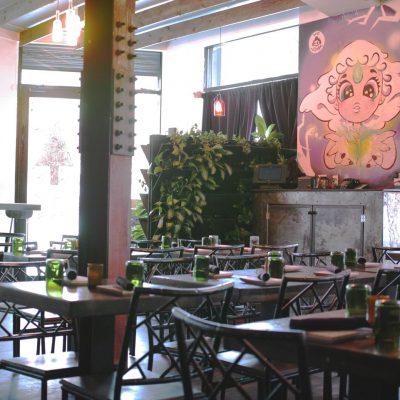Williamsburg’s Black Tree sources from farms within 300 miles, but keeps its neighborhood vibe
by Meredith Napolitano Stettner
On a sunny September Monday, Sandy Dee Hall, chef/owner of Black Tree BK, places an order from the Phillips Farm stand (from Milford, NJ) at the busy Union Square Greenmarket: shelled peas, 10 pounds of tomatoes (red and green), sugar snaps, red and yellow onions, purslane, beets, and more. He’s been a Phillips customer for four years.
“I’m here four to five times a week, sometimes twice a day if I forget something,” said the decidedly un-cheffy-looking chef, who wears a black tank, a baseball cap slightly tilted left, and resides in Bushwick, riding everywhere on a slim pink bicycle. “This is where my flavor base is. I ask, ‘What does this ingredient want to do,’ then execute,” he explained of Black Tree’s availability-based menu planning.
Hall’s reliance on farmers is vital to his restaurant’s mission to serve only local fare, using ingredients sourced within 300 miles. The furthest Hall has found meat from is Utica, NY, while most produce is grown within 100 miles. You won’t find avocados or bananas on his menu, nor citrus.
In fact, Hall is bothered by the avocado topping craze. “I think it’s odd that everyone wants it, and there are consequences, agriculturally. There’s a better way to do things.” At brunch, you’ll find a local fried farm egg or two atop most dishes instead.
Hall tested the waters for his locavore idea originally in 2012, in the form of a sandwich pop-up shop in Crown Heights. Based on that success, he and business partner Mac Sillick launched Black Tree Lower East Side, before opening a second pair of doors on a corner in prime Williamsburg in the fall of last year, dishing up “Urban American” fare with a strong greenmarket slant.
Hall grew up far from a farm, though. An orphan with a nomadic inner-city upbringing, his palate was limited. (“A good meal was Chinese or Popeye’s,” he recalled.) Food was simply not on the priority list. It was while working at The Breslin, as a server, where he developed a palate, but also saw a polarizing expense gap associated with farm-to-table fare. At his next gig as a bar manager at Monument Lane in the West Village, Hall latched onto then-chef Robert Barry for an apprenticeship for two months, prepping by day and bartending by night.
Both were experiences that instilled in him an idea to make farm-to-table accessible, and to break down the barriers of fanciness associated with fine cuisine. With Hall being mostly self-taught, and with only a few cooks in the kitchen at any given time at Black Tree, he’s challenging modern ways, too, with old-fashioned labor, prep, and production, which the owner said, does cost. “You pay for it. You’ll have labor expenses—one person peeling, dicing, etc., but this is about cooking smarter.”
In addition to shelling out more for peas from farms and picking only local, seasonal produce for his vegetable-centric menu, Hall fills out produce by occasionally foraging herbs, mushrooms, and berries. Perhaps most strikingly, he economizes in meat sourcing. Black Tree focuses on an animal a week, which it orders in whole, and Hall uses every part.
“I’m not buying the parts and just serving duck breasts,” he said. Instead, what is served will depend on what can be taken advantage of: a braising-prime leg is turned into tacos, all the bones into bone broth, and tenderloins thinly sliced into carpaccio.
Pig, cow, chicken, duck, sheep, rabbit, and seafood are typical rotations, though occasionally Hall will get a water buffalo or “something strange.” The size and versatility determine the dishes. With a pig, Hall will get five types of dishes, a cow, up to 12, and those plates will also change seasonally.
He also wants people to expand their meat palates. “People may not think they are into rabbit,” he said, “but they can try it in a way that is different. So I’ll do a crispy rabbit leg, which is similar to a chicken leg, but lighter.”
For the meatless, in August, there was a vegetable only week, and burrata cheese sourced from Di Palo (in Soho) is always a staple, swirled in the summertime with tomatoes and edible flowers and served on wood boards.
Recently, it was pig week, and Hall was serving pork loin Milanese, using the belly for bao (meat-filled buns) and the spare rib for a hash. The meat from the head of the pig was used in a terrine. His pigs, from Stryker Farms in PA, “are the happiest and cleanest I have seen,” he said.
Urban nostalgia inspires the refined, overgrown-warehouse decor. You’ll find graffiti mixed with hanging pendants made from recycled glass and repurposed wine bottles, and the walls are otherwise painted black and just this side of a happy shade of dark blue. A hanging plant wall is planned for fall, and a source board lists farmers, beer breweries, and local biodynamic winemakers and distilleries.
Jacket and tie are decidedly not necessary at this chef ’s table. Whether one rides over on a Harley or a vintage bicycle, they’ll be served farm-fresh fare. Reaching even further back into his roots of inner-city childhood, Hall aspires to open a farm-based, fast-casual non-profit one day, rerouting kids from a typical McDonald’s choice. “I’d just like everyone to be able to eat the best quality stuff,” he said.
Black Tree BK
261 Metropolitan Avenue / 718.387.7611 / blacktreenyc.com








